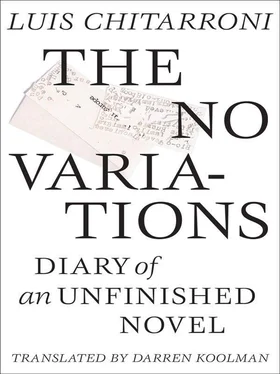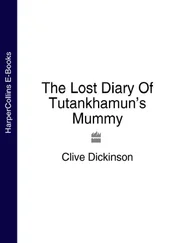NO
Parallelism: “The Old Bachelor.”
NO
Elena claimed husbands should either be poisoned or deceived (if possible, both) between the first pregnancy and the (second) tale of Scheherezade.
Mustn’t go back to where one was abandoned. One should know better. Because the right opportunities are scarce (the wrong too plentiful, if one sticks around).
Buried keys
Examples seen in Nabokov, hidden in James. The genius of that other Jeffrey Aspern — the maestro — Ray Limbert, is to be always suggestive, elusive; the opposite in V.N.: visibility of the other’s genius: Sebastian Knight, The Gift , John Shade and also the protagonist of Bend Sinister .
He was acquainted with the jury. There was an ineffective trio of persons who ignored the fact there was a natural bias in favor of bestowing the prize freely.
O Lord, don’t punish me for that.
Lord, you’ve already done it.
Russian Story. Semblance.
Onomastics, renown, polynymy, and denial in Agraphia
Eloy Armesto
[Extracting the Thursday from The Man who Was . Biannual Newsletter of the Universidad Autónomo de Los Sunchales]
Going against Occam’s razor, the nominative entities of Agraphia are born to reproduce themselves, to proliferate, and after a short time, be discarded. Their life-cycle can be compared with that of the common cold. “Each syllable of their names, a germ, a potential pandemic.” Categorical proliferation, diametrical. The names function as algebraic permutations that make no difference to the final result. They accumulate, are collected, arrayed, and then spent (in the double sense). The metastasis occurs where fame is unevenly distributed. A whole argot of sectarian terms to designate where: first, the “paludinal glitterati” in Septic Midrash , then the “phalansterian demographic” constructed to “contradict the anecdote.” In the journal, “there is no theory,” except what makes you rich. Theory, they proclaimed, plagiarizing Proust, is the price tag on a gift. Nicasio Urlihrt was quoted in the newspapers as having said that admission into Agraphia relies not so much on intellectual common ground but on the postulant’s mandatory baptism at the font.
So, at the “Sestina Session” they began laying down the (criminal) tracks towards what they believed was an amoral approach to anonymity — the pseudonym — a meeting that ended in compromise instead of unanimity. The uninterrupted progress of those tracks , according to “The Change.” For his final choice, Eiralis removes some, alters others. “Notes for a Plagiarist,” by Belisario Tregua, summons those eroici furori , four of the nine forms of love, both blind and blinded. With retrospective rage, one or another dissenter will sometimes change even the precursor’s name, exchange it for another. Who is Hilarión Curtis? The anecdote goes that he was a predecessor of Nicasio Urlihrt, although he is not. And in different places the apic ancestor appears to make the story seem apocryphal, to submit another dossier to the lore. So that Belisario Tregua, the original Glaucus of Urlihrt, can quickly make the exchange with Sabatani, the Glaucus et Diomedes permutatio .
Insofar as Agraphia is an extended discourse on the insignificance of names, real or invented — as a Traherne, Arthur Paul Clerkwell, Jacques Derrida, Lord Swindon, Guyotat, Gayelord Hauser — the name or title is an indication of this, and the activity most often adopted by these personages is trying to remember the names of things or, failing this, coming up with new ones … As in “The Dreadmist”: “What name could we have chosen for what was going on. I suggested to them: Gobi, after the desert. Or after the tanguero, Alfredo Gobbi, with two Bs. One of them said aberrations don’t make good names. Optical aberrations, as I recall …” On most of those ruled pages Tregua had specifically chosen for recording the Agraphia committee minutes, it’s apparent everyone is involved in the act of coming up with names for people, stories, and various other things.
The other “perdurable aspect,” besides the Arcadian myths, as the members saw them, is the ceremonial, or liturgical, for which they gathered together countless emblems, constructed a host of personas, prepared myriad refutations to any argument that might be leveled against them. There are three tribunals: the first, consisting of three judges, is the casuistical; the second, consisting of twelve judges, is the episcopal; the third, consisting of the nine malic molds, is the diametrically surreal …
When Nicasio and Elena Urlihrt were trying to come up with a name for the journal, they had firmly in their heads the name of Georges Bataille’s review, Acéphale . [ Still needed , Belisario’s letter to Dos, anaphora. Seven times.]
Agraphia was then forty years old. “Longevity and solipsism have gradually transformed it”—declared Oliverio Lester—“into the strangest and most idiotic literary journal in South America.” Many agree. Its longevity seems to be a result of its strict discretionary code, and a policy of nonintervention so severe, most members have developed hormonal disorders. As only a few other journals have done, Agraphia dispensed with all matters concerning the outside world — or according to Lester in an interview, “barely sensed it.” Its members spent their days engrossed, their faces bent towards the page, their thoughts reflecting back from it, as if Agraphia was scripture, and everything else Apocrypha. Such interiority results in those indoor games which Rómulo Stupía and Répide Sabatani never tire of reproaching, citing examples of the behavior of characters in the stories, and the suffocating absence of chronology. Their output — in “Early,” “Imitation …,” “Xoch. Diary,” “Out of a Greek …”—has been thanks to a pseudonymity that guarantees the absolute identity of the precursor, the template, distinguishing him from the list of alternative names, which are dropped, as it were, throughout a narrative that makes biography, or the story of a single person, read like a “family romance.” As for the length of that story, it is determined by an almost trance-like focus: a focus on the self that admits no external influence and on events that takes no account of any chain connecting them. Luini, who was consulted for a poll by an even more obscure journal, Jolt , affirmed that Agraphia is “apolitical, glabrous, almost oligo- …” A nice bit of opportunism considering the glabrous and near-oligos were expelled from the platonic republic during those years [Lesiva Víctima: pseudonym of Teodolina Teischer, in Political Readings ]. It’s curious that so many who scornfully renounce their past services to Agraphia , do so in a way that’s characteristic of the journal — with scorn. Rare excursions are sovereign kingdoms [choosing one’s own books, people, situations], small exiles, exclusions …
His first (“anonymous, collective”) task is still only half-accomplished . At the height of preparations for the seventh issue, all the compromises, the petty alliances, the underhandedness that so often stymies progress on “the task,” were once again brought to bear for an obligation Nicasio and the apostles didn’t want to be burdened with: writing an editorial. [They would say later, “We didn’t want an editor or a publisher, but we were forced to be both … So we committed parallel crimes pseudonymously, and came out looking like spotless lambs.”] This explains their cross-purpose rationale of both affirming and denying responsibility for what they do. Nevertheless, having not failed to tell the truth, nor tell a lie, they inadvertently found the median, a word in between deception and honesty (perhaps it was in the first anthology). Of the best stories published, three were written anonymously—“Too Late,” “The Fasting of Lourdes,” “Vienna while in Prague”—three were collaborated on—“The Candles,” “Dominion,” “The Scent of Thunbergias”—and five were anonymous collaborations—“A Double Celebration,” “Houdini and Cravan,” “Supporting Acts,” “The Cold,” “Quodlibet” (although the non plus ultra of such a collaboration, “Out of a Greek Gift,” appears in the latest issue). Their insecurity, impatience, paranoia — said Luini in the aforementioned interview — made them feel obliged to put on “a show of invincibility.” Buenos Aires: a world already dimming by the late sixties due to the influence of psychoanalysis, according to Urlihrt. But, in the profession, there was a stammer, a nervous tick, a hint of uncertainty. Of Urlihrt becoming more assured in the following decades: “After so many years beating about the bush trying to get noticed, we finally began writing with an eye towards posterity, instead of fame or notoriety … and that happened once we exorcised our insecurities, our fears.” The practice of condescension is tied to prophecy: “As we said without really understanding: we do everything by halves . Yes, as we said: it was mainly the programmatic nature of the formulation [or affirmation] that made us take a step backwards, recoil.” In implementing these misdeeds — these “adulterated truths”—there was some fruition; as when Urlihrt used that example from his youth to vindicate “the journal’s ethical principles” … The idea “It’s not what God wants but what God is” that we see in “The Scent of Thunbergias,” and which is distorted and amplified in “Returns,” and seems in both stories to be “an infirmity that walks hand-in-hand with death,” is part of the orthodoxy, the religion of Agraphia …
Читать дальше












